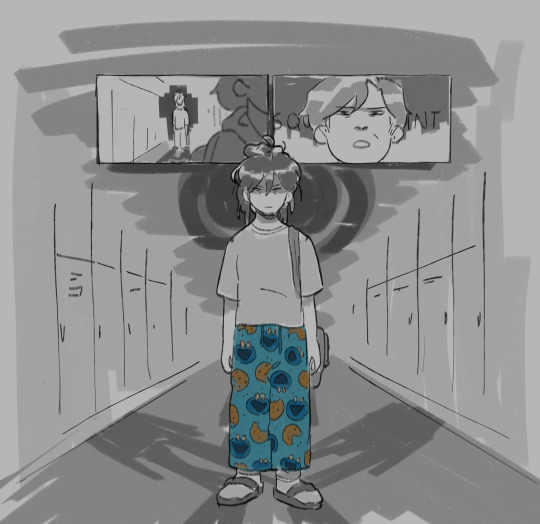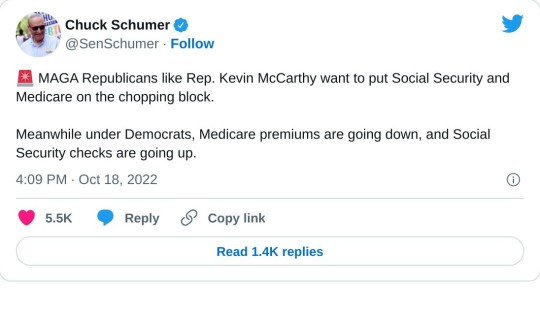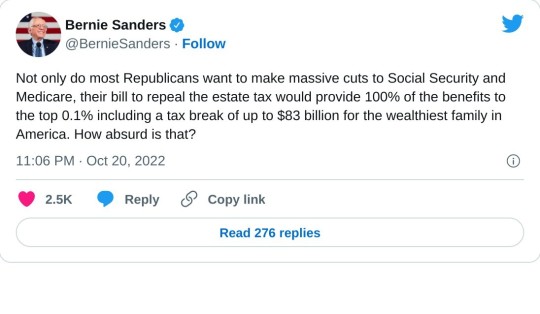#social security works
Text
On Thursday, the Social Security Administration announced its largest cost of living adjustment for beneficiaries in four decades, an inflation-driven raise of 8.7% that will take effect in January 2023. That increase matches the average annual COLA from 1975 through 1982, an era of recessions and high inflation. Annual Social Security raises declined after that year. From 1996 through 2021, they averaged 2.3%, and were zero in some years. The 2021 raise was substantially higher: 5.9%.
The new increase in benefits will be pricey. On the other hand, the cost to taxpayers of the entire Social Security program pales in comparison with the cost of federal subsidies for rich Americans enrolled in private or supplemental retirement plans, such as individual retirement accounts (IRAs). According to Federal Reserve data from 2019, only 31% of households from the poorest half of the wealth spectrum contributed to such a plan, while 91% of households in the top wealth decile did.
This suggests that low-wealth retirees rely heavily or exclusively on Social Security, but all US workers get to collect benefits starting at age 62. As of last month, nearly 66 million Americans, rich and poor alike, were getting monthly checks. Most are retirees, but there are also spouses, disabled workers, survivors of deceased workers, and dependent children. The largest and best-compensated group, the retired workers, averaged $1,674 a month, or about $20,000 per year.
The SSA now pays out about $1.2 trillion a year in benefits all told, but those outlays are largely funded by payroll taxes paid by workers who will later reap the benefits. In 2021, the price tag of the entire program—benefits plus administrative costs—totaled $1.14 trillion, of which $1.09 trillion was covered by payroll taxes, income taxes on benefits, and interest. In other words, the federal Social Security subsidy was only about $50 billion.
Compare that with subsidies for private plans and IRAs, which cost the government nearly eight times as much—about $380 billion a year, according to the Joint Committee on Taxation. And unlike Social Security subsidies, these subsidies skew heavily toward the highest earners.
There’s a reason I noted the year 1996 above. Before then, as I point out in this earlier exposé about America’s retirement system, private retirement accounts were strictly regulated and not heavily subsidized. Starting that year, federal lawmakers—led by then Reps. Rob Portman (R-Ohio) and Ben Cardin (D-Md.), began introducing bipartisan retirement “reform” packages that pumped more and more federal dollars into bolstering private retirement savings, mainly to the benefit of high-income workers and Wall Street.
University of Virginia law professor Michael Doran, who dug deep into the subject for a January 2022 paper titled, “The Great American Retirement Fraud,” suggested that lawmakers, rather than helping rich Americans shuffle even more of their money into tax-deferred or tax-exempt retirement funds, could instead pass laws to benefit Americans who actually need help in retirement. That might include simply beefing up Social Security, he wrote.
Instead, yet another bill that benefits wealthy savers sailed through Congress. And Republican Rick Scott released a set of aspirations for his own party—an 11-point “Plan for America,” of which one provision would let all federal laws “sunset” every five years—including laws governing Social Security and Medicare.
#us politics#news#mother jones#social security administration#social security cuts#social security#social security works#individual retirement accounts#federal reserve#cost of living adjustment#Joint Committee on Taxation#Rep. Rob Portman#rep. Ben Cardin#Michael Doran#The Great American Retirement Fraud#sen. rick scott#Plan for America#2022
47 notes
·
View notes
Text
Don’t listen to the Republicans and their anti-Social Security propaganda. They’ve been trying to unalive that whole program since the 1940s.
9 notes
·
View notes
Text

#us politics#2022#gop#Republicans#conservatives#social security checks#social security works#social security#2022 midterms#2022 elections#vote#vote blue#social security cuts
23 notes
·
View notes
Text
When will the U.S. government run out of U.S. dollars?
Seems like a simple question — “When will the U.S. government run out of U.S. dollars?”
Sadly, the media writers, economists, and politicians don’t seem to know. Some claim “soon.” Some claim “eventually.” A few say “never.”
Scott Horsley
For instance, Scott Horsley:
Scott Horsley is NPR’s Chief Economics Correspondent. He reports on ups and downs in the national economy as well as fault lines…

View On WordPress
#Alan Greenspan#Ben Bernanke#Janet Yellen#maya macguineas#monetary non-sovereignty#monetary sovereignty#Nancy Altman#Scott Horsley#Social Security Works
0 notes
Text


The Heritage Foundation is the sponsor of Project 2025.
We have been screaming about this.
VOTE BLUE.
#social security#the heritage foundation#project 2025#fuck these people#donald trump#trump 2024#trump#maga#maga morons#gop hypocrisy#gop#americans first#americans#working adult#blue collar#breaking news#own the libs#vote biden#biden harris 2024#we have a serious problem#fascisim#authoritarianism#trump crime family#god is a republican
3K notes
·
View notes
Text






wonderful day to remember ninjago has a canon highschool au
#mad as hell i posted this like two days ago and tumblr ate it then logged me out of my acc????#lloyd has dyed blue hair inspired by mr snail dood inspired by that one ninjago scriptwriter that said he would btw. if you even care#anyway there are many scenarios buzzing in my noggin about gaps in the movie i’m filling them all with hcs#like i am so sure nya could go into service or social work or law or security because shes a genius when it comes to laws and rights#but she has anger issues and she hates authority so she can’t get a job anywhere#that’s why she loves being a ninja!!#plus her steel cap boots are for stomping on people!!!#hate zane’s characterisation in the movie it’s creepy asf in this he’s just everyone’s favourite lab partner#anyway more hcs in art cominbb soon#ninjago#the lego ninjago movie#tlnm#lego ninjago#lloyd garmadon#ninjago lloyd#ninjago jay#ninjago nya#kai smith#nya smith#ninjago kai#ninjago cole#ninjago zane
5K notes
·
View notes
Text
Sometimes I wonder if people understand that you cannot make people stop comparing mentally ill and neurodivergent people to like serial killers and horror movie monsters without abandoning most of how we conceptualize and categorize mental illness. It's not like an ableism that comes from outside of the DSM or ICD from laymen, it's entirely baked in. The entire mental health system is about categorizing mentally ill and ND people as threats, liabilities, and inconveniences, while blaming it on intrinsic brain illnesses based on the ideas of typically incredibly biased and bigoted psychologists from several decades ago which are not founded in evidence (and said ideas persist mostly unchanged with the reasonings merely altered or justified with a shrug). The fact that after every mass shooting there is more posturing of "mental health awareness" and increasing MH services, when most mass shootings are committed by radicalized cis (and usually white) men tells you that a lot of this is security theatre. The MH system really just makes it more unsafe to seek medical help but it helps "neurotypical" people feel better, and it is the comfort of "NTs" that is most prioritized by this system. And of course, anyone who commits acts of extreme violence like mass shootings will likely be labeled mentally ill first (rather than radicalized, exc.) because of the circular logic that no one can be a Threat without being mentally ill. Do you see The Problem?
#and most mass shooters usually have some manifesto/note exc detailing their extreme hatred of women and disabled people#and so forth but of course socialization and radicalization is never the problem guys#text#my stuff#mass shooting tw#ableism#sanism#antipsychiatry#well it's not JUST security theatre. it's mostly about profit as well#I see a pattern where most security theatre exists to legitimize and justify state sanctioned violence#i find it funny how most psychology ideas are modernized by like saying#'yeah we don't have actually know how this works. we'll still keep doing it tho.'
90 notes
·
View notes
Text
its so weird seeing posts that mock uncle jim for worrying about li ming's queerness as though his dead boyfriend's parents (legally) stealing his entire life savings and leaving him to manage a restaurant business specifically because gay couples aren't legally recognized as couples wasn't what put him in a cycle of crushing debt and endless poverty in the first place
#yeah hi CONTEXT MATTERS#can western fandom pls stop ignoring this shows biting social commentary on queer people not being legally recognized#also heart is the darling of all time BUT his careless lie literally forced li ming to work off a debt that was never his#and wouldve seriously impacted jim's business and financial state had wen not offered to work free#which was a boon but having to live on someone elses generosity like that is still a stress#because people (understandably!!!!) can and do get tired of giving away a lot of time and energy for nothing#wen is uncommonly generous and luckily its not too long before other circumstances help lift jim to safer footing#but none of that was SECURE getting to that point#jim is right to worry! it comes out badly and li ming's queerness is not the actual issue but jims reasoning is EXTREMELY UNDERSTANDABLE#sighs#moonlight chicken
368 notes
·
View notes
Text
in a righteous world Leonard McCoy could have spent a long, restful retirement serving cunt in georgia
#and yet he was drafted#the injustice of it all#they kept my girl working till he was like 150 yrs old!!#does social security mean nothing to you starfleet#star trek#star trek tos#leonard mccoy#star trek: the motion picture
115 notes
·
View notes
Text


If Republicans take control of the House this fall, they plan on using debt limit talks — and the possibility of throwing the U.S. into default — if they don’t get their way on slashing government programs.
According to a new interview with House Minority Leader Kevin McCarthy (R-California), the party is planning on using must-pass debt ceiling legislation to force through the GOP’s agenda.
“You can’t just continue down the path to keep spending and adding to the debt,” McCarthy said in an interview with Punchbowl News, ignoring the fact that economists view national debt obligations as often signaling the health of the economy. “We’re not just going to keep lifting your credit card limit, right,” he continued. “And we should seriously sit together and [figure out] where can we eliminate some waste? Where can we make the economy grow stronger?”
When McCarthy refers to eliminating so-called waste, it is likely that he is referring to, among other things, the GOP’s plans to cut Medicare and Social Security, two of the most popular and vital anti-poverty government programs in the U.S.
Republicans have been attacking the programs over the past months. Sen. Ron Johnson (R-Wisconsin) has threatened to put budgets up to congressional debate every year, which would almost definitely lead to cuts. Alarmingly, earlier this year, the Republican Study Committee, the largest Republican caucus in the House, put out a plan to raise the age at which people receive full benefits from both programs to 70, while implementing a rule that would raise the eligibility age over time.
The debt ceiling is an effective bludgeon for Republicans to use for this purpose. The debt ceiling accounts for government funding to provide promised payments for programs like Medicare and Social Security, as well as military salaries and other “existing legal obligations,” according to the Treasury Department.
Republicans had threatened to put the U.S. in default last September, after former President Donald Trump urged the party to do so. They appeared to be posing as deficit hawks — something they only do when a Democrat is in charge — while Democrats were debating the Build Back Better Act.
If they pull a similar move in 2023, it could be similar to 2011, when the GOP manufactured a debt ceiling crisis that ultimately “led directly to the worst recovery following a recession since World War II,” according to the Economic Policy Institute.
If the debt ceiling isn’t raised by fall of 2023, when the government is slated to run out of funding, the U.S. could find itself in a situation similar to last year, when it was at risk of defaulting on its loans. This could have triggered a global recession and would have disastrous short- and long-term consequences for the U.S., as the creditworthiness of the country would be ruined.
In other words, Republicans appear to be willing to hold the U.S. and global economy on the brink of disaster in order to force Democrats to capitulate to their demands.
This way, too, Republicans can blame whatever economic fallout will come with either a default, government shutdown or cuts to Medicare and Social Security on Democrats. By pursuing these cuts during a Democratic presidency, they can point fingers at President Joe Biden if they are pushed through — potentially providing the GOP with a weapon come the 2024 election.
Republicans are laying out other plans for if they take the House, which polls say they are likely to do. GOP members of the House Education and Labor Committee have made a list of prominent labor officials like Labor Secretary Marty Walsh and National Labor Relations Board General Counsel Jennifer Abruzzo as well as Biden’s pro-worker task force to target with hearings and attacks if they take control of the House.
#us politics#news#2022 midterms#2022 elections#2022#twitter#tweet#sen. chuck schumer#sen. bernie sanders#truthout#rep. kevin mccarthy#recession#global recession#medicare#save medicare#social security#social security works#economics#economy#debt ceiling#biden administration#estate tax#sen. ron johnson#Marty Walsh#department of labor#Jennifer Abruzzo#National Labor Relations Board
117 notes
·
View notes
Text
youtube
#Republicans want us to work till the day we die#Republicans want to take away our Social Security#vote blue#please vote blue#vote biden#vote democrat#fuck republikkkans#fuck republicans#Youtube
21 notes
·
View notes
Text
For the Love of God if I see one more person use the term ND as a synonym for higher-functioning ADHDtism I will take my jaws and rip out the flesh of all the people within an 100 mile radius from me starting with myself
#People looove to exclude Intellectual Genetic and Developmental disabilities in their advocacy#Oh you're such a martyr but suddenly you see somebody with DS or FXS or something else and you cower in fear#Hell this goes for lower functioning/higher needs Autistic ppl too Hell Even Non-verbal or Semi-verbal autistic ppl#You're so quirky then someone who relies on social security to maintain a living comes at you and all of a sudden they're freaks of nature#Or like youll see someone with Cerebral Palsey or Down Syndrome apply for a job and all of a sudden it's “why are you working”#And taking 10 steps backwards in ending infantilization and ableism#“Anti-Ableism” until someone w psychotic OCD comes knocking on your door for genuine help with paranoia and intrusive thoughts#And All Of A Sudden.#Like Girl#The call is coming from inside the house#Sorry I saw a post in disabled tag and got filled to the brim with rage that I started seething and seeing red#it's not the first time Ive ranted abt this and its certainly not going to be the last#And next month in July Just You Wait#I will Not stfu about disability the entirety of Jully#Anyway#How are yall
15 notes
·
View notes
Text
SSI is a purposefully convoluted system of bureaucracy that is made to be difficult to understand/navigate and you cannot change my mind.
i should not have to call one office to ask a question about information i was told yesterday in the same office, only to get condescended upon and given a second office to call.
i should not call the second office and get once again condescended to because of the question i had. not only was i condescended to, i was condescended to over questions i did not even ask. and when i had the gall to correct the person on the phone for the question i was actually asking, i was spoken to like i couldn't understand basic information about the program.
the system made to 'help disabled people' is nothing more than a thinly veiled program designed to keep people poor and not asking questions, because you should be grateful for the $943 that you're given a month even if its barely enough to live off of.
#cav who gets shit done#sadie#this post is made out of anger#this system is so fucked up and doesnt work#disability is only $240 a month or so#but if you receive SSDI then you cant receive SSI#so the amount you receive can only total to $943 and its so FUCKED#not even to mention the massive amount of energy it takes to have to call the offices and get sent on a wild goose chase bc none of them#have their shit in order or good communication with one another#and god forbid you have a straight forward question about something you were told BY A WORKER IN OFFICE#< sadie wrote these#disability rights#disabled#SSI#SSDI#social security#social services#disability#disability benefits
12 notes
·
View notes
Note
can you tell me more about this jjk hacker au
this is set in cyberpunk-ish universe where
yuuji finds out he's not entirely human (on both sides of his family actually) and accidently ingests the world's most evil virus (sukuna is still his uncle somehow)
gojo is trying to figure out how to bypass all of sukuna's security to free yuuji; he is the world's greatest (supposedly) ethical hacker, a cryptography professor and ceo of his own (very successful) cybersecurity firm where he employs his students; he is not only very good at accessing computer systems but he can easily manipulate people into simply revealing the information he needs
nobara actually really wanted to be a popular streamer (in order to become a successful influencer) but every time someone pissed her off in a game she would just hack into their account and steal everything; gojo offered her a scholarship based on that and while nobara does not particularly care about getting a degree she used the chance to get out of her hometown
maki is on a sports scholarship and could probably be an olympic athlete but her actual goal is to get her hands on information about the zenin that will allow her to become the head of the family; she is very good at accessing buildings / physical spaces (or just torturing information out of people)
megumi is writing increasingly powerful algorithms that can easily access different systems but more importantly he is the world's most suffering teacher's assistent; he felt indebted to gojo because gojo used to tutor him for free and bought him any hardware he wanted so megumi thought he could pay him back by helping him with his lectures. he is regretting everything now.
if you get a phone call from your boss asking for a password and you need to tell it to him now it's urgent that was actually inumaki
panda rarely (never?) leaves the campus but if you need another identity he's the guy; he will make you a linkedin account with 200 connections in 1h
this is the pre-shibuya team lineup so yuuta is currently doing his semester abroad after accidently creating the world's first conscious ai that he modelled after his dead childhood gf; he did start the singularity but this is not about him so gojo was like 'this is going to be miguel's problem for now'
#thank you so much for asking let's all play in this sandbox#shoko is probably a cyborg doctor nanami is cfo of gojo's company but he does all the ceo work and geto is a black hat hacker#ok looking at it now hacker au does not fit entirely#but I do love stories of people who use social engineering to access private information hmm information security au#but whatever#jjk
6 notes
·
View notes
Text
...
#hm. im in limbo. but at least i can draw again at last. ive never spent so long not wanting to draw. it was terrible#my job search lasted 4 days before i secured a position at target but i dont start until the 26th so im drifting until then#it feels so weird. like i dunno. i keep thinking abt jobs in a weird way now bc i just sorta drifted into what i do#weird academic stuff but i think most jobs arent like being a grad student and that never really occured to me#i dunno why. i could have done so many things but here i am. an ecologist mostly. i dunno. well see what the summer brings#maybe ill grow some social skills. its sorta weird but like the medication has made my head less terrible with intrusive thoughts. like i#can actually drive my car without hyperventilating which is fucking wild. so Maybe ill grow some confidence abt interacting with the world#going back in the fall still seems impossible rn but so does starting a job somewhere else. but i dunno#not where i expected to be in my life. im just lucky i dont have to worry much abt money#especially bc i got an ultrasound done so they cold make sure something wasnt wrong with my uterus#and its fine. guess it just hates me but that means i spent like 350 dollars for a 10min scan that showed nothing#ay. the us medical system#anyway. i guess ill continue drifting until the 26th#probably i should find something to do. or work on my old unpublished data#unrelated
15 notes
·
View notes
